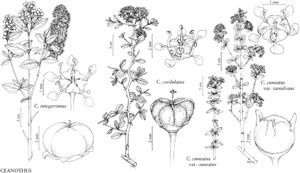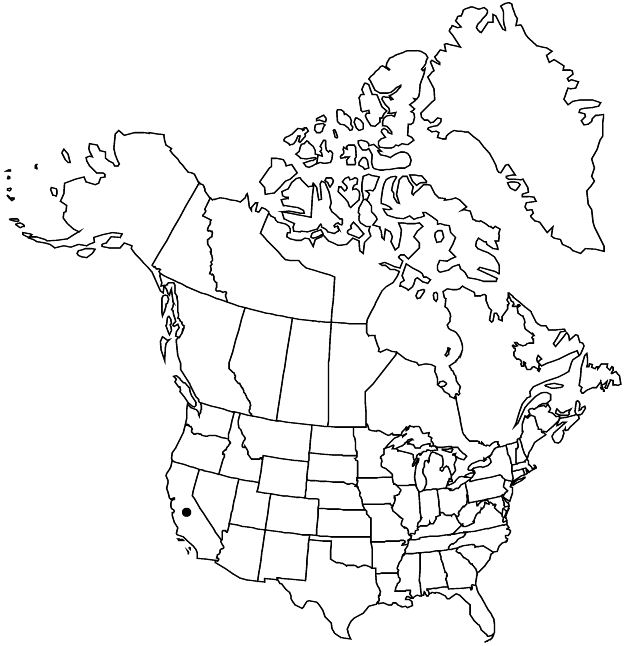Difference between revisions of "Ceanothus cuneatus var. ramulosus"
Fl. Francisc., 86. 1891.
FNA>Volume Importer |
FNA>Volume Importer |
||
| Line 10: | Line 10: | ||
|special_status={{Treatment/ID/Special_status | |special_status={{Treatment/ID/Special_status | ||
|code=F | |code=F | ||
| − | |label= | + | |label=Illustrated |
}}{{Treatment/ID/Special_status | }}{{Treatment/ID/Special_status | ||
|code=E | |code=E | ||
| Line 31: | Line 31: | ||
|elevation=10–800 m. | |elevation=10–800 m. | ||
|distribution=Calif. | |distribution=Calif. | ||
| − | |discussion=<p>Variety ramulosus occurs disjunctly in the San Francisco Bay area (Alameda, Contra Costa, Lake, Marin, Napa, Santa Cruz, and Sonoma counties) and on coastal slopes in western San Luis Obispo and Santa Barbara counties. In both areas, plants occur primarily but not exclusively on serpentine soils. Some specimens in the San Francisco Bay area are intermediate to < | + | |discussion=<p>Variety ramulosus occurs disjunctly in the San Francisco Bay area (Alameda, Contra Costa, Lake, Marin, Napa, Santa Cruz, and Sonoma counties) and on coastal slopes in western San Luis Obispo and Santa Barbara counties. In both areas, plants occur primarily but not exclusively on serpentine soils. Some specimens in the San Francisco Bay area are intermediate to <i></i>var.<i> cuneatus</i>, while others in San Luis Obispo and Santa Barbara counties suggest intergradation with <i></i>var.<i> fascicularis</i>. Plants on Point Sal Ridge in western Santa Barbara County are low-growing, less than one meter, and have ascending to spreading stems, features that are retained in cultivation.</p> |
|tables= | |tables= | ||
|references= | |references= | ||
| Line 40: | Line 40: | ||
-->{{#Taxon: | -->{{#Taxon: | ||
name=Ceanothus cuneatus var. ramulosus | name=Ceanothus cuneatus var. ramulosus | ||
| − | |||
|authority=Greene | |authority=Greene | ||
|rank=variety | |rank=variety | ||
| Line 54: | Line 53: | ||
|publication title=Fl. Francisc., | |publication title=Fl. Francisc., | ||
|publication year=1891 | |publication year=1891 | ||
| − | |special status= | + | |special status=Illustrated;Endemic |
| − | |source xml=https://jpend@bitbucket.org/aafc-mbb/fna-data-curation.git/src/ | + | |source xml=https://jpend@bitbucket.org/aafc-mbb/fna-data-curation.git/src/eaa6e58056e40c9ef614d8f47aea294977a1a5e9/coarse_grained_fna_xml/V12/V12_868.xml |
|genus=Ceanothus | |genus=Ceanothus | ||
|subgenus=Ceanothus subg. Cerastes | |subgenus=Ceanothus subg. Cerastes | ||
Revision as of 20:00, 16 December 2019
Shrubs, (0.5–)1–2.5 m. Stems erect, ascending, or spreading; branchlets gray to grayish brown. Leaf blades of fascicled and non-fascicled leaves cupped, widely oblanceolate, widely obovate, or orbiculate, 5–15 × 3–12 mm, length usually less than 2 times width, margins usually entire, rarely 1–4-toothed, apex rounded, truncate, or retuse. Flowers: sepals, petals, and nectary lavender to blue. Capsules 5–6 mm wide. 2n = 24.
Phenology: Flowering Feb–May.
Habitat: Rocky slopes, often on serpentine, chaparral, pine woodlands.
Elevation: 10–800 m.
Discussion
Variety ramulosus occurs disjunctly in the San Francisco Bay area (Alameda, Contra Costa, Lake, Marin, Napa, Santa Cruz, and Sonoma counties) and on coastal slopes in western San Luis Obispo and Santa Barbara counties. In both areas, plants occur primarily but not exclusively on serpentine soils. Some specimens in the San Francisco Bay area are intermediate to var. cuneatus, while others in San Luis Obispo and Santa Barbara counties suggest intergradation with var. fascicularis. Plants on Point Sal Ridge in western Santa Barbara County are low-growing, less than one meter, and have ascending to spreading stems, features that are retained in cultivation.
Selected References
None.

